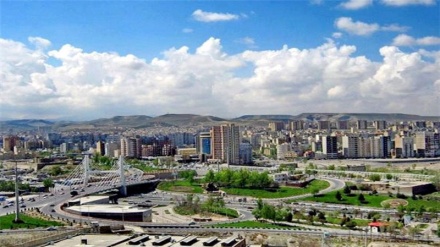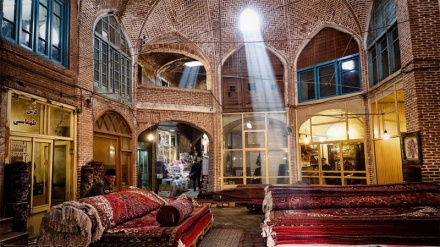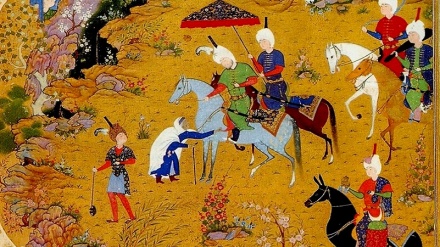Tabriz, 2018 (20)
Welcome to this week's episode of the series "Tabriz, 2018". In the year 2018, the city of Tabriz was chosen as the tourism capital of the World of Islam, and an opportunity was raised to introduce the attractions and capacities of this beautiful city to others.
In addition to this city's cultural, historical, and geographical potentials, it has been the birthplace of numerous artists and literary figures. Today, we introduce some of the famed poets of this city.
Tabriz and East Azarbaijan Province are the birthplace of several poets and literary figures, which has turned the Poets' Cemetery into one of the unique venues of this city. Nearly 400 renowned Iranian literary figures have been laid to rest in this cemetery.
In addition to the acclaimed Iranian poet, Seyed Mohammad Hussein Behjat Tabrizi, who went by the penname, Shahriar, the city of Tabriz has been home to several other celebrated figures in the fields of Farsi literature and poetry; one of whom has been Qetran Tabrizi.
He is the first Azari poet, who composed poems in Farsi and Dari languages. He was born in the city of Tabriz in 11th Century AD. He is contemporary to the other well-established poet, Naser Khosrow, who throughout his journeys, met and conferred with Qetran.
Qetran, similar to his contemporary poets, mastered literary skills and made further use of poetic imaginations in composing his poems. He was well-known in the cities of Khorasan and Iraq, and his contemporary poets confessed to his sublime talents and major skills in composing poetry.
Mirza Mohammad Ali Saeb Tabrizi is another famed poet, who was born in Tabriz in the year 1592 AD. He lived during the rule of Safavid dynasty, and upon the order of the Safavid King, Shah Abbas the First, he was forced to migrate to the city of Isfahan in the company of his family, settling in this city. This pre-eminent poet, upon settling in Isfahan, began to learn the common sciences of his era.
This acclaimed poet prepared himself to face the unknowns in his thirties, traveling to India, and managing to gain entry to the royal court of Shah Jahan. Thereafter, he paid visits to Kashmir, Herat, and Kabul, while later returning to Isfahan.
He is among the very few poets, who shot into fame throughout Iran, India, and the Ottoman Empire, during his lifetime, with his fans traveling from different cities to Isfahan to catch a glimpse of him.
Saeb also traveled to the cities of Mashhad, Qom, Kashan, Ardebil, and Tabriz, in addition to joining the entourage of Shah Abbas the Second, in a journey to Mazandaran region.
In accordance to historical texts, Saeb Tabrizi passed away in the year 1676 AD, with his tomb located in a small garden in the city of Isfahan.
Saeb has composed around a hundred odes, praising the other renowned poet, Molana. Overall, Saeb is said to have composed between 80,000 to 300,000 poetic lines, in addition to 20,000 poetic lines in Azari language.
This renowned poet was a well-mannered and modest man. He was kind-hearted to an extent that he has admired all of his contemporary poets in his poems. Saeb maintained an independent and distinguished poetic styles. He has composed different types of poems, however, he mainly favored composing odes.
He mainly adhered to Indian style of poetry; within which poetic imaginations and similes play decisive roles.
Rakhshan Etesami, popularly known as Parvin Etesami, the best known Iranian poetess, was born in Tabriz on March 14, 1907. She learned Farsi, English, and Arabic language in her childhood and began composing poems, under the supervision of her father.
She published her collection of poems, which is comprised of 606 poems, including long odes, and elegies. Her poems convey her strong emotional bond to her father, her sublime talent and immense enthusiasm in acquirement of knowledge, her pure soul, her opposition to injustice, and her sympathy toward the poor and needy.
She lived at the era of issuance of Constitutional Order, collapse of the Qajarid Dynasty, ascension of Reza Khan to the throne, Reza Khan's dictatorial regime, and break out of World War I; all of which alerted her towards her contemporary topics of importance, and made her sensitive toward the incidents and developments that took place in her lifetime. In her era, due to shortage of the press and other mass media, her only option for familiarization with political topics, was her father. In her poems, she stands up against injustice, calls for uprooting poverty, and seeks justice, and fulfillment of her ideals.
Her poems, due to their fluent language, and advices, have been included in the academic books which are taught in Iranian schools.
Parvin Etesami passed away in Tehran on April 4 1941, at the age of 34, and was laid to rest in the Holy Shrine of Hazrat Masoumeh (SA) in the holy city of Qom.
MR/ME


